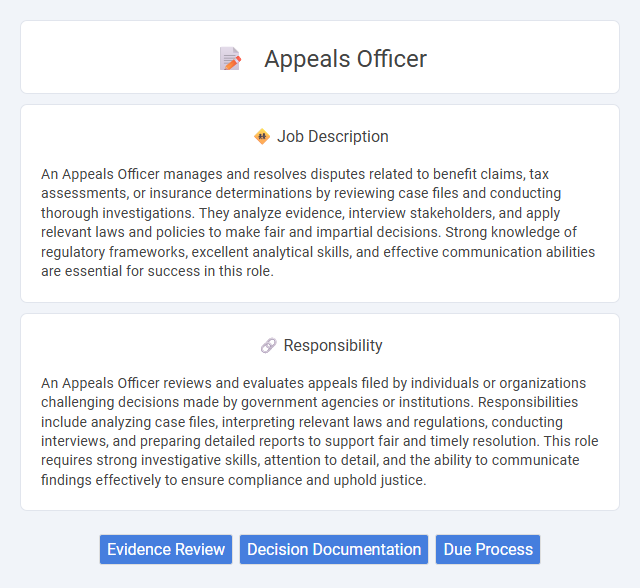
An Appeals Officer manages and resolves disputes related to benefit claims, tax assessments, or insurance determinations by reviewing case files and conducting thorough investigations. They analyze evidence, interview stakeholders, and apply relevant laws and policies to make fair and impartial decisions. Strong knowledge of regulatory frameworks, excellent analytical skills, and effective communication abilities are essential for success in this role.
Individuals with strong analytical skills and the ability to remain impartial are likely suitable for an appeals officer role, as the job involves reviewing cases and making fair decisions. Those who can handle detailed documentation and maintain confidentiality under pressure may find the position fitting. People who struggle with complex problem-solving or lack attention to detail might face challenges in performing effectively as appeals officers.
Qualification
An Appeals Officer typically requires a bachelor's degree in fields such as law, public administration, or business, with many positions favoring candidates who hold a master's degree or relevant certifications in legal studies or dispute resolution. Demonstrated experience in administrative law, regulatory compliance, or case management is essential, alongside strong analytical, communication, and negotiation skills. Proficiency in legal research, policy interpretation, and the ability to handle sensitive information with discretion are critical qualifications that enhance job performance and career advancement in this role.
Responsibility
An Appeals Officer reviews and evaluates appeals filed by individuals or organizations challenging decisions made by government agencies or institutions. Responsibilities include analyzing case files, interpreting relevant laws and regulations, conducting interviews, and preparing detailed reports to support fair and timely resolution. This role requires strong investigative skills, attention to detail, and the ability to communicate findings effectively to ensure compliance and uphold justice.
Benefit
Appeals officers likely provide valuable benefits by ensuring fair and impartial review of decisions, which can enhance trust and transparency within organizations or government agencies. Their role probably helps individuals contest outcomes, potentially correcting errors and promoting justice. The position may also offer personal fulfillment through advocacy and problem-solving opportunities.
Challenge
An Appeals Officer likely faces the challenge of carefully analyzing complex cases where decisions must be reviewed for fairness and accuracy. The role probably requires balancing strict adherence to regulations with empathetic consideration of individual circumstances. Managing high workloads and tight deadlines may frequently test problem-solving abilities and attention to detail.
Career Advancement
An Appeals Officer plays a critical role in reviewing and resolving disputes in legal, tax, or social services sectors, offering numerous pathways for career advancement. Mastery in case analysis, legal research, and effective communication can lead to promotions into senior appeals or supervisory positions. Pursuing certifications or advanced degrees in law or public administration further enhances opportunities for leadership roles within government agencies or private firms.
Key Terms
Evidence Review
An Appeals Officer specializes in the thorough evaluation and assessment of evidence to ensure the accuracy and fairness of decisions in administrative or legal cases. Their expertise lies in analyzing documentation, witness statements, and legal precedents to identify key facts and discrepancies. Effective evidence review by Appeals Officers supports unbiased rulings and upholds the integrity of the appeals process.
Decision Documentation
Appeals officers are responsible for thoroughly reviewing case files and ensuring accurate decision documentation to uphold legal standards. They create detailed reports that clearly articulate the rationale behind each appeal determination, supporting transparency and accountability. Precise documentation facilitates effective communication with stakeholders and aids in future case evaluations.
Due Process
An Appeals Officer ensures due process by carefully reviewing decisions and evidence to uphold fairness and legal standards in administrative hearings. They analyze case files, verify compliance with regulations, and facilitate impartial resolutions to protect individuals' rights. Attention to detail and strong knowledge of legal procedural requirements are essential for maintaining the integrity of the appeals process.
 kuljobs.com
kuljobs.com